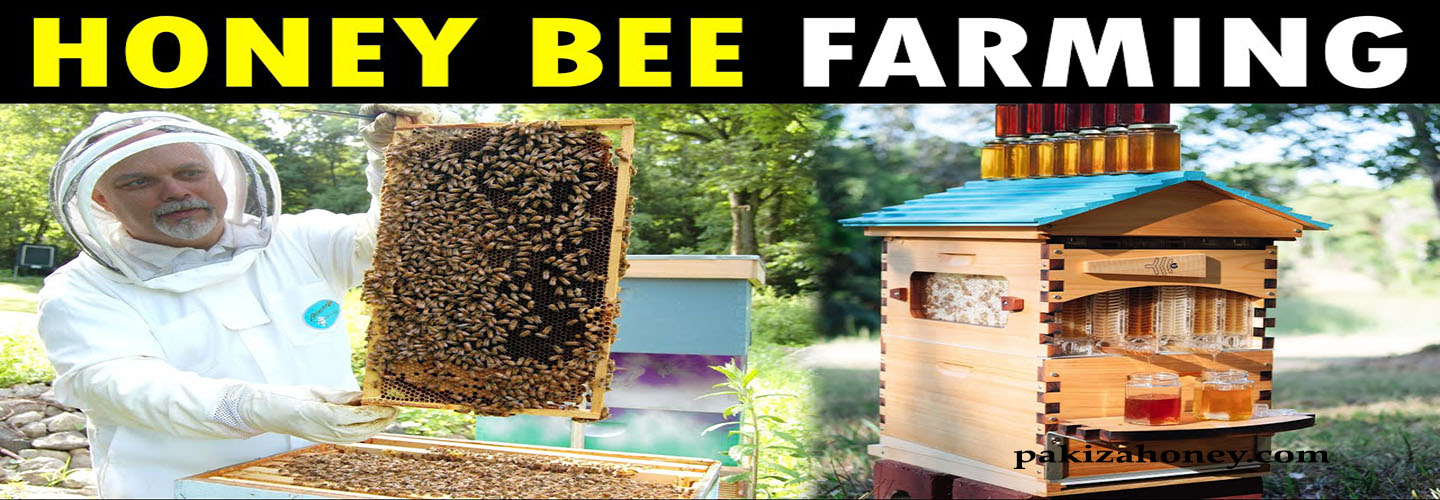- Your cart is empty
- Continue shopping
What is Honey Farming?
Honey farming is the practice of raising bees for the purpose to produce honey and other beneficial products like beeswax, pollen, and royal jelly.
Honey farming, also known as beekeeping or apiculture, is the practice of raising honeybees
This involves providing suitable habitats for the bees, such as beehives, and managing the colony for optimal health and honey production.
The harvested honey is then processed and packaged for consumption or commercial sale.
Why is Honey farming important?
Honey farming is important because it provides a source of honey and other bee products, supports pollination and crop yields, and provides economic benefits for farmers and communities.
It is a valuable and sustainable practice that contributes to both the well-being of humans and the environment.
Honey farming is important for several reasons:
-
Food production
Honey is a valuable food source that has been used by humans for thousands of years. Honey farming provides a way to produce honey in a controlled and sustainable manner, ensuring that there is a steady supply of this natural sweetener.
-
Pollination
Honeybees play important role in the pollination of crops and wildflowers. Honey farming helps to maintain and increase the population of this important pollinator, which in turn helps to improve crop yields and support biodiversity.
-
Economic benefits
Honey farming can provide a source of income for farmers and rural communities, especially in areas where agriculture is the main source of livelihood. The sale of honey and other bee products can contribute to the local economy and support sustainable development.
-
Conservation
Honeybees and other pollinators are facing numerous challenges, including habitat loss and pesticide exposure. By keeping bees and producing honey, honey farmers can help to conserve and protect these important species.
-
Health benefits
Honey is a natural sweetener that has been shown to have a range of health benefits, including antioxidant properties and antibacterial properties. By producing high-quality honey, honey farmers can provide a nutritious and healthy food source for local communities.
In general, honey farming plays an important role in supporting food production, pollination, the economy, conservation, and human health. It is a valuable an
Honey Farming Process
The honey-making process begins when bees collect nectar from flowers and store it in their honeycomb. The nectar is then transformed into honey through a process of regurgitation and evaporation.
The bees flap their wings to create air circulation, which helps to evaporate the moisture from the nectar and transform it into honey. Once the honey is ready, the bees cap the honeycomb with beeswax to preserve the honey for later use.
In details, the below steps are involved:
-
Hive Management:
The first step in honey farming is to set up and manage beehives, which are the homes for honeybees. The hives should be placed in an area with a good supply of nectar-producing plants, such as flowers, and should be maintained in a clean and healthy condition.
-
Bee Management:
Beekeepers must also care for the honeybees themselves, ensuring that the colony is healthy, well-fed, and free of disease. This includes monitoring the colony for signs of disease, such as mite infestations, and taking appropriate action to control pests and diseases.
-
Pollination:
Honeybees are important pollinators, and beekeepers can help increase crop yields by placing hives near crops. This helps ensure that the plants receive enough pollination for a successful harvest.
-
Honey Harvesting:
When the honey is ready to be harvested, the beekeeper must extract the honey from the comb, which is the wax structure in which the honey is stored. The beekeeper may use a variety of tools and techniques, such as a honey extractor or a comb-cutting tool, to remove the honey from the comb.
-
Honey Processing:
After the honey is extracted, it must be processed to remove any debris, such as wax, and to homogenize the mixture. The honey can then be packaged and stored, or sold commercially.
To harvest honey, beekeepers use a variety of equipment, including a smoker, bee suit, and hive tool. The smoker is used to calm the bees and make them more docile during the harvest.
The beekeeper then removes the honeycomb frames from the hive and uses a special tool to scrape off the wax cap. The frames are then placed in a centrifuge, which spins the honey out of the comb and into a container.
The honey is then filtered to remove any impurities before it is bottled and sold.
Honey farming can be a rewarding and fascinating hobby or a full-time business. It requires knowledge, skill, and dedication to manage bees and produce high-quality honey.
Overall, honey farming requires a combination of technical knowledge, practical skills, and a love for bees and their role in our ecosystem.
Pakiza provides pure honey of different types to check out Click Here
To study more about honey farming Click Here

